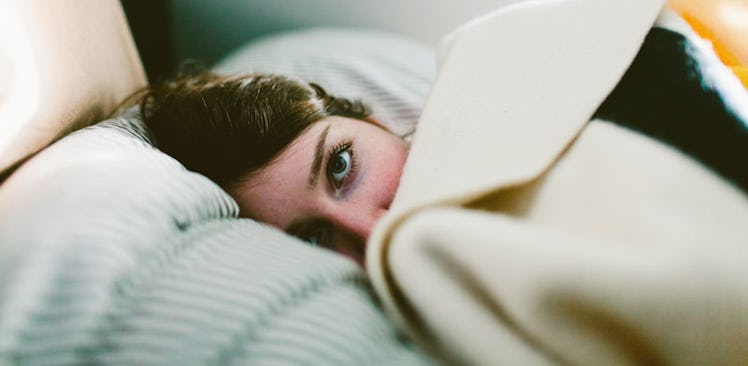
5 Things You Do Every Day That Destroy Your Sleep And Ruin Your Life
With everything we have to worry about in life, who has time to think about sleeping, the one time of day that is supposed to be thoughtless?
We worry about our work lives, how much exercise we're getting, our skin care routines, our social lives, our diets, how much we drink and whether or not we should meditate, read or walk the dog more.
Our waking life is riddled with things to think about, and the very last thing we ever stop to modify is our sleep.
At best, our sleep is an afterthought, but more often it's an inconvenience, a forced break in the midst of our exciting, non-stop, fast-paced lives.
Last week, I sat in on a webinar with a sleep expert Daniel Jin Blum, PHD.
I (admittedly) didn't want to do it because I don't care about my sleep. It's boring! I'm BUSY.
Something about this webinar, however, took me by surprise.
It was the fact that not getting good sleep can absolutely destroy our lives and our overall health.
According to Dr. Blum,
Stroke, hypertension, type 2 diabetes, obesity and other metabolic syndromes are some of the long-term consequences of not getting sleep.
And that's just the long-term consequences.
In the short term, lack of sleep or poor quality of sleep can lead to hyper-arousal and increased aggression.
(UM, HELLO, I PUSHED AN OLD LADY ON THE M TRAIN THIS MORNING!)
I also happened to learn the unfortunate truth that so many of us live our lives in a way that completely destroys our chances of getting some good shut-eye.
1. Caffeine
The average daily consumption of caffeine by adults in the US is about 300 milligrams per person, which is about three times higher than the world average.
So obviously, we're not going to quit drinking caffeine.
Without it, we'd all give up on our dreams, and the future is relying on us.
But one thing to consider is, caffeine can delay the timing of your body clock.
These effects will reduce your total sleep time as well as the amount of deep sleep that you enjoy.
One study found that consuming caffeine 6 hours before bedtime reduced total sleep time by 1 hour.
2. Alcohol
While alcohol at night will generally promote falling asleep more quickly (as proven by the years you spent in college), "chronic drinking can result in total loss of slow-wave (deep) sleep, and it also inhibits rapid eye movement (REM) sleep," according to Dr. Blum.
Not to mention, using alcohol as a sleep aid can lead to a dependence on the drug.
That's right, alcohol is actually a drug. A hell of a drug, though. It's honestly my favorite one.
Sorry to be the bearer of bad news.
3. Exercising late at night
I've always heard that exercising late at night will help you sleep, but as it turns out, that's a myth.
I was surprised to find that Dr. Blum listed this as one of the major everyday mistakes we make that messes with the quality of our sleep.
According to Blum, exercising too late at night elevates your core body temperature, which can reduce the amount of melatonin (the sleep hormone) your body produces.
This sends a signal to your bod that it's NOT bedtime, it's PARTY time.
4. Social jet lag
Another common disruption to a healthy sleep schedule is what Dr. Blum referred to as "social jet lag."
That's when you have a sleep schedule that requires you to wake up early, but then you stay out late at night on weekends.
If you do this a lot (ahem, GUILTY ON ALL COUNTS), Dr. Blum says, “You're essentially flying back and forth across the coasts in 46 hours, and it can take a whole week for you to adjust back to your normal schedule."
5. Working in an office
Finally, a real excuse to quit your job.
Most of us work in an environment where we are not exposed to a lot of natural light, but this can be harmful to your body's natural circadian rhythm.
Dr. Blum says, "Working in an office all day makes it more difficult for your body to recognize the difference between day and night, and this can mess with your body's ability to produce melatonin."
Blum also notes that "taking walks during the day can help, especially between 2 to 4 pm."
Dr. Blum also suggests limiting the amount of exposure to light for up to two hours before bedtime.
How dim?
According to Blum, "If you can see colors, it's probably too bright."
Most of these so-called "mistakes" are actually totally unavoidable parts of our everyday lives.
So, is there anything we can do on a daily basis to actually get better sleep without moving to the middle of nowhere and becoming, like, a goat farmer or something?
Blum suggests adopting a deep breathing mindfulness practice for "not just when you're stressed out but on an every day basis, so your body adapts and is quicker to respond to being in a relaxed state."
I've been practicing an aggravated state for most of my adult life, and I'm able to shift from zero to 60 in less than a minute.
So, I guess it checks out that the brain could be trained to do things the opposite way, too.
Happy Z's!